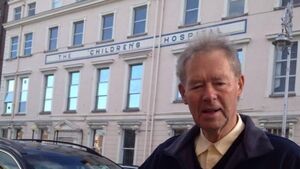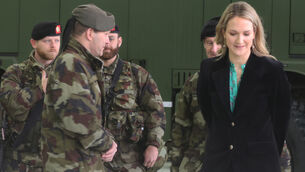Fallon's Town Talk: Sadness at the deaths of two beloved national figures

The late Mícheál Ó Muircheartaigh
If imitation is the sincerest form of flattery, few people in modern Irish history have been as lauded by others as Mícheál Ó Muircheartaigh, who died last Tuesday. His instantly recognisable, lilting voice was distinctive but not inimitable. Indeed, his voice has been a cornerstone of the act of every Irish mimic for the best part of 40 years.
The GAA president Jarlath Burns even lapsed into his own Ó Muircheartaigh imitation as Gaeilge agus as Béarla in a heartfelt tribute on RTÉ’s ‘Six-One News’.
Mícheál was the match commentator as storyteller, eventually becoming the nation’s favourite storyteller as he drew on the ancient seanachí tradition.
Radio was his medium. I have vague memories as a child of Ó Muircheartaigh commentating on minor finals or Railway Cup matches in Irish on television but not leaving any impression.
Dara Ó Cinnéide, a former All-Ireland-winning captain with Kerry who has become an excellent broadcaster, paid one of the most perceptive tributes to his friend. He pinpointed the moment when Ó Muircheartaigh went from ‘Mícheál the commentator’ to ‘Mícheál the legend’.
It was when the other GAA broadcasting icon, Mícheál O’Hehir, was forced to retire in 1985 due to ill-health. Ó Muircheartaigh shrewdly stuck with radio rather than switch to television. I remember this vividly because by 1987, he had become the voice of the GAA rather than any of those who succeeded O’Hehir on television.
Ó Cinnéide made another astute point: while his fellow Kerryman was from one of the most ardent football strongholds in the country, Ó Cinnéide most associates Ó Muircheartaigh with the Munster hurling championship. Think about how many of Mícheál’s most unforgettable lines are from hurling matches.
In the late 1980s, it was still the case that only two hurling matches and three football matches were live on television. Why 1987 sticks with me is that that summer Tipperary and Cork clashed in an epic Munster hurling final draw and replay and Ó Muircheartaigh elevated those matches, and himself, to epic heights. He would retain the status of national treasure for the rest of his life.
Micheál provided the soundtrack to our summers, linking a glorious, almost mythical, past to a vibrant present in his rhapsodic commentaries. For a commentator who could invoke Christy Ring or Nickey Rackard in an instant, he never wallowed in the past; he believed modern players were as good as had ever played. Ó Cinnéide divulged that Jack O’Shea was Ó Muircheartaigh’s favourite player but listeners would never have known this.
He travelled all around the country to functions, a lifelong Pioneer who was at the centre of myriad celebrations. After his death was announced, I searched and was delighted to find an article I’d kept from the ‘Roscommon Herald’ of May 10th, 2011 when Micheál visited Waldron’s in Athleague for a function to honour Johnny Haughey. My late father was in a photo from that night. Many other people in those photos have also since passed away, including, of course, both Johnny and Micheál.
In his many radio and TV appearances since his official retirement in 2014, Ó Muircheartaigh always radiated optimism. He gave the nation, particularly his elderly contemporaries, hope during the darkest times of Covid-19 lockdowns.
Long ago, Mícheal became as iconic and revered a figure in the history of the GAA as any of the titans he commentated upon.
Within hours of Mícheál Ó Muircheartaigh’s death, the passing of RTÉ’s former Northern Ireland and European editor, Tommie Gorman, was also announced. It was a shock. Whenever I settle down in front of my trusty laptop to write this weekly column, Tommie looks back at me from the cover of his engrossing memoir, ‘Never Better: My Life in Our Times’. The book, given to me by my sister-in-law, nestles on a chair beside me. As I write these lines I’m glancing at Tommie in a maroon jumper, standing in front of the coastline of his beloved Sligo.
Tommie Gorman’s battles with cancer have been well documented but, in his public appearances since his retirement from RTÉ in 2021, he appeared in good health. The sincerity and volume of tributes since his death underline his stellar work as a reporter but also his role as a facilitator during the Northern Ireland Peace Process and his ceaseless encouragement to other cancer sufferers. Like Mícheál Ó Muircheartaigh, Tommie Gorman exuded optimism and positivity.
The last line of Tommie’s book has added poignancy now: “With a sense that these are bonus years, the first thought I have on waking, most mornings, is ‘Never Better’.” May those two great men rest in peace.






